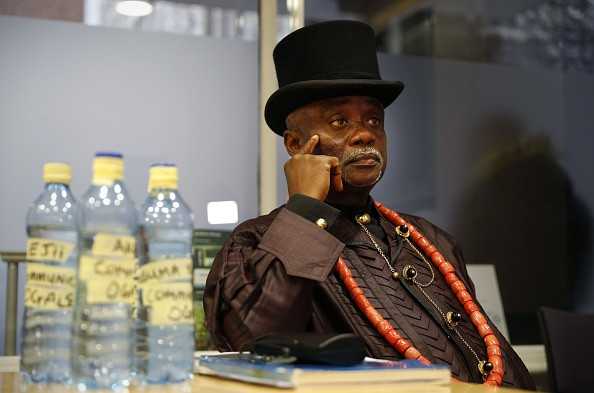Nigerian tribal king flies to London seeking justice for his people over oil spills blamed on Shell
King Emere Godwin Bebe Okpabi tells High Court 'my people are dying from contaminated water'.

A Nigerian tribal king has flown to London to attend a hearing on the environmental damages caused by years of oil spills in Nigeria blamed on oil company Royal Dutch Shell. Britain's High Court began to hear arguments on whether English courts can hear two legal claims on behalf of more than 40,000 Nigerians against Shell and its Nigerian subsidiary, Shell Petroleum Development Company of Nigeria (SPDC). In March 2016, two Nigerian communities sued Shell in London over multiple oil spills in the Niger Delta.
During the hearing on 22 November, King Emere Godwin Bebe Okpabi held plastic bottles believed to contain contaminated water from his community in Ogale, in Nigeria's oil-rich Niger Delta region, claiming "my people are drinking this water."
"There are strange diseases in my community – skin diseases, people are dying sudden deaths, some people are impotent, low sperm count," he was quoted by AFP as saying. "I can afford to buy water. But can I afford to buy for everybody? No. We are dying."
A 2011 report by the United Nations Environment Programme (UNEP) found that oil spills contaminated clean water and damaged the fishing industry in Nigeria – stating immediate action was needed.
Shell has argued the case should be heard in Nigeria, as it involves its Nigerian subsidiary SPDC. The Anglo-Dutch oil company will use the first three days of hearings to challenge the court's jurisdiction.
A spokesperson for the oil giant claimed both Bille and Ogale "are areas heavily impacted by crude oil theft, pipeline sabotage and illegal refining which remain the main sources of pollution across the Niger Delta."
The spokesperson added SPDC has not produced any oil or gas in Ogoniland, the region surrounding Ogale, since 1993.
However, plaintiffs have argued that ageing and leaking pipelines owned by the company still run through the area.
SPDC further claimed it had delivered water and healthcare to communities and was supporting the implementation of the UNEP process, which saw the launch of a $1bn (£691m) clean-up operation in Ogoniland in June.
The operation – which the UN report said could be the "most wide-ranging and long term oil clean-up exercise " – aims to restore drinking water, land, creeks and important ecosystems such as mangroves. The UN estimated that the clean up of Ogoniland could take up to 30 years.
Oil spills in Ogoniland
Royal Dutch Shell and British Petroleum started oil operations in the area in 1958, after oil was first discovered in Nigeria in 1956. They were later joined by several other companies.
It has been estimated that at least 7,000 oil spills occurred in Ogoniland and the rest of the Niger Delta between 1970 and 2000. The damages of oil spills on the environment and communities led to the creation of the Survival of the Ogoni People (Mosop) movement, led by Ken Saro-Wiwa. The leader was later arrested and executed amid widespread condemnation.
Militant groups in the oil-rich Niger Delta region took hold in the early 2000s, following the deterioration of people's living conditions blamed on the increase of oil-related activities by foreign exploration corporations. Tensions flared in the local communities as some ethnic groups felt they were being exploited and did not benefit from the crude oil on their land.
Two major spills occurred in the Bodo community in 2008, destroying thousands of acres of mangroves and fishing populations. In 2015, Shell reached a $84m (£55m) settlement with the Bodo fishing community affected by the spills.
In November 2015, a joint report by Amnesty International and the Centre for Environment, Human Rights and Development accused Shell of failing to implement the 2011 UN recommendations.
In March 2016, two Nigerian communities sued Shell in London over multiple oil spills in the Niger Delta.
© Copyright IBTimes 2025. All rights reserved.






















